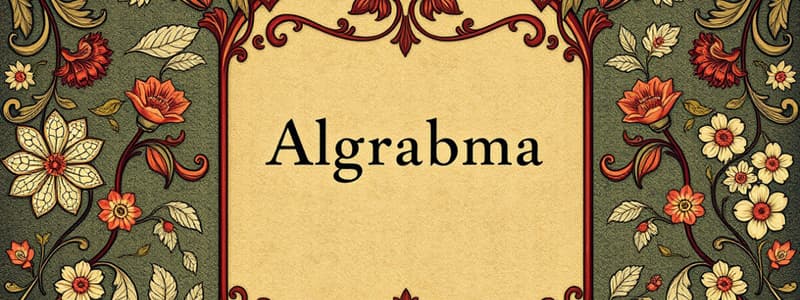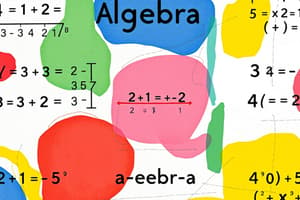Podcast
Questions and Answers
What does the term 'set' refer to?
What does the term 'set' refer to?
What is an 'element' in the context of sets?
What is an 'element' in the context of sets?
An object that is in the set.
Define 'subset'.
Define 'subset'.
Consists of elements from the given set.
What is an 'identity' in algebra?
What is an 'identity' in algebra?
Signup and view all the answers
What does 'formula' mean in mathematics?
What does 'formula' mean in mathematics?
Signup and view all the answers
Define 'literal equation'.
Define 'literal equation'.
Signup and view all the answers
What is an 'inequality'?
What is an 'inequality'?
Signup and view all the answers
What is 'compound inequality'?
What is 'compound inequality'?
Signup and view all the answers
Define 'absolute value'.
Define 'absolute value'.
Signup and view all the answers
What is an 'irrational number'?
What is an 'irrational number'?
Signup and view all the answers
What defines a 'rational number'?
What defines a 'rational number'?
Signup and view all the answers
Define 'real number'.
Define 'real number'.
Signup and view all the answers
What is a 'natural number'?
What is a 'natural number'?
Signup and view all the answers
Define 'whole number'.
Define 'whole number'.
Signup and view all the answers
What defines an 'integer'?
What defines an 'integer'?
Signup and view all the answers
What is an 'equation'?
What is an 'equation'?
Signup and view all the answers
Define 'ascending order'.
Define 'ascending order'.
Signup and view all the answers
What does 'descending order' mean?
What does 'descending order' mean?
Signup and view all the answers
What is the 'order of operations'?
What is the 'order of operations'?
Signup and view all the answers
Define 'expression'.
Define 'expression'.
Signup and view all the answers
Study Notes
Set Theory and Numbers
- Set: A collection of objects such as numbers, used in mathematics to group related elements.
- Element: An individual object within a set, essential for defining the contents of the set.
- Subset: A smaller set formed from elements of a larger set, containing some or all elements.
Mathematical Concepts
- Identity: An equation that holds true for all values of its variables, indicating a universal truth.
- Formula: An equation establishing a relationship between one quantity and one or more other quantities, often used in calculations.
- Literal Equation: An equation using letters to represent both variables and constants, commonly seen in algebraic expressions.
Inequalities
- Inequality: A mathematical expression indicating that two values are not equal, involving greater than or less than relationships.
- Compound Inequality: An expression formed from two or more inequalities, providing a range of possible solutions.
Number Types
- Absolute Value: Represents the distance of a number from zero on a number line, regardless of direction (always non-negative).
- Rational Number: A number that can be expressed as a fraction or ratio of two integers, including whole numbers and decimals that terminate or repeat.
- Irrational Number: Cannot be expressed as a ratio of two integers; characterized by non-terminating, non-repeating decimal expansion.
- Real Number: Encompasses both rational and irrational numbers, forming the entire set of numbers on the number line.
- Natural Number: Positive integers starting from 1; does not include zero.
- Whole Number: Non-negative integers, including zero.
- Integer: The set of whole numbers both positive and negative, including zero.
Equations and Expressions
- Equation: A mathematical statement where two expressions are set equal to each other, connected by an equal sign.
- Expression: A combination of terms, which may involve variables, constants, operators, and parentheses, but does not include an equality sign.
Order and Operations
- Ascending Order: Arrangement of numbers from least to greatest, useful in organizing data.
- Descending Order: Arrangement of numbers from greatest to least, helpful in prioritizing values.
- Order of Operations: The sequence to follow when evaluating expressions, typically parenthesis-first, then exponents, followed by multiplication/division (left to right), and finally addition/subtraction (left to right).
Studying That Suits You
Use AI to generate personalized quizzes and flashcards to suit your learning preferences.
Description
Test your understanding of key vocabulary in Algebra Unit 1 with these flashcards. Each card includes essential terms and their definitions to help reinforce your learning. Perfect for students looking to master algebraic concepts!




